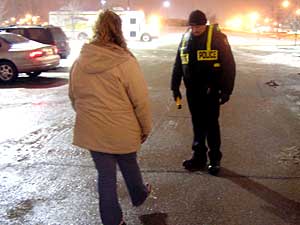|
Photos
|
May 19, 2005
The Minnesota Supreme Court has struck down as unconstitutional the Legislature's changes to the state's drunk driving law. Two years ago, the Legislature eliminated a requirement that entitled suspected drunk drivers to "prompt judicial hearings." The change was made for convenience and to save the state money. The court's ruling reinstates the requirement for a hearing within 60 days.
St. Paul, Minn. — The law now reverts back to its 2002 version, which entitles suspected drunk drivers to judicial hearings no later than 60 days from the time they petition the court. Since that change was made, drivers often wait far longer for a court hearing to determine whether the charges are valid.
The ruling stems from the case of Patricia Fedziul. Dakota County authorities pulled her over for suspected drunk driving in 2003. Fedziul tested negative for alcohol, but tested positive for amphetamines her doctor prescribed as a mood stabilizer.
Nevertheless, she lost her license for two and a half months, until she could plead her case before a judge. Ultimately, authorities cleared her of driving under the influence.
Fedziul's attorney Jeffrey Sheridan challenged the law as unconstitutional. He says it's important to remember that the case was about protecting an innocent driver's rights. While Sheridan says he's pleased he won the case, he says the new requirements won't make much difference.
"The driver himself has 30 days to ask for review, and then the court has 60 more days before the thing has to be heard," says Sheridan. "You will find that for many, many, many drivers, that means they will have ridden out their entire 90-day revocation before the case is ever heard."
Sheridan wanted the court to revive the 1980 law, where a driver was entitled to a hearing before their license was revoked at all.
Speaking on behalf of the Department of Public Safety, Kevin Smith says he's actually pleased with the ruling, because the court left most of the law in place. He said the idea that the court did not implement the 1980 version is good news for the department.
"The bottom line is business will go on as usual for those people who get arrested for drunk driving. From our perspective, this is a very important law enforcement tool," says Smith.
State Sen. John Marty, DFL-Roseville, says the Legislature got carried away in amending the law.
"Most of the reasons for the amendments was to just make it simpler -- it's easier for the state to not go through the hassle of giving someone a prompt judicial review," says Marty. "It might save a little money, it might be a little easier, but the courts say you've got due process rights."
Attorney Jeffrey Sheridan says emotionally charged laws like these are what ultimately test the Constitution. He says no one is in favor of drunk driving, but it's important that such laws pass constitutional muster.
"Either we believe in those principles that are embodied in our Constitution or we don't. And if we don't, then that's fine. There's a way to change that and it's called amending the Constitution," says Sheridan.




